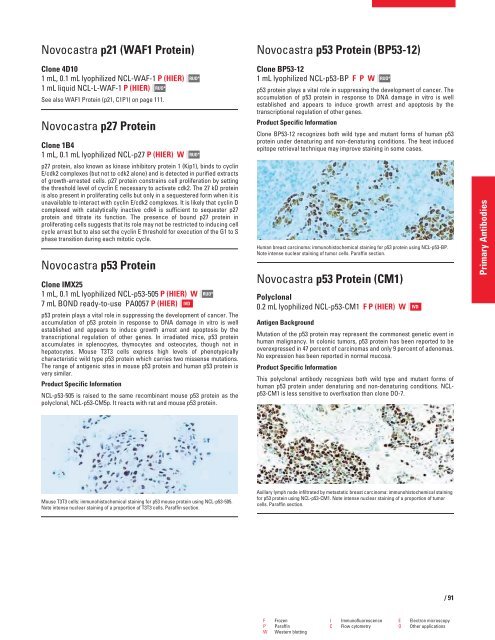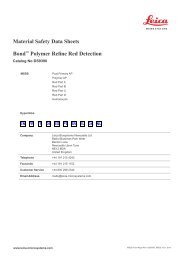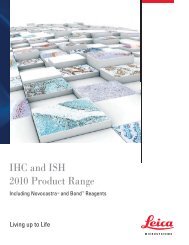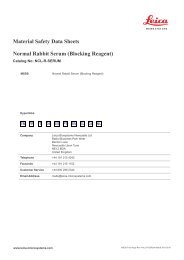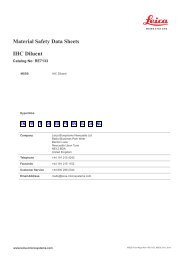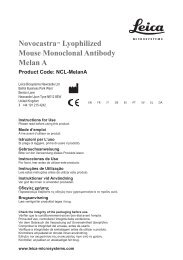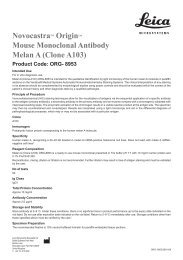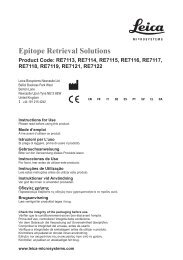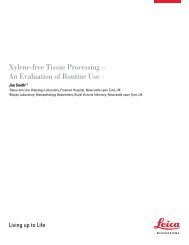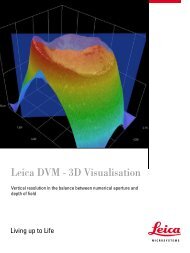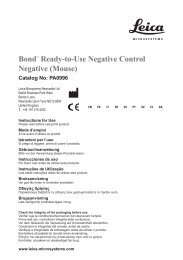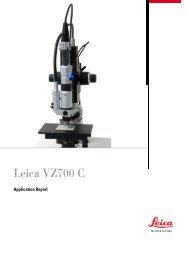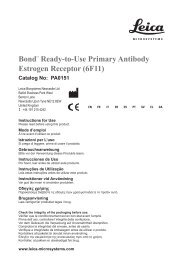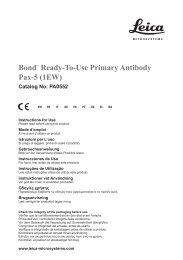QF0159 Marketing Release Record
QF0159 Marketing Release Record
QF0159 Marketing Release Record
Create successful ePaper yourself
Turn your PDF publications into a flip-book with our unique Google optimized e-Paper software.
Novocastra p21 (WAF1 Protein)<br />
Clone 4D10<br />
1 mL, 0.1 mL lyophilized NCL-WAF-1 P (HIER)<br />
1 mL liquid NCL-L-WAF-1 P (HIER) RUO*<br />
See also WAF1 Protein (p21, C1P1) on page 111.<br />
Novocastra p27 Protein<br />
Clone 1B4<br />
1 mL, 0.1 mL lyophilized NCL-p27 P (HIER) W<br />
p27 protein, also known as kinase inhibitory protein 1 (Kip1), binds to cyclin<br />
E/cdk2 complexes (but not to cdk2 alone) and is detected in purified extracts<br />
of growth-arrested cells. p27 protein constrains cell proliferation by setting<br />
the threshold level of cyclin E necessary to activate cdk2. The 27 kD protein<br />
is also present in proliferating cells but only in a sequestered form when it is<br />
unavailable to interact with cyclin E/cdk2 complexes. It is likely that cyclin D<br />
complexed with catalytically inactive cdk4 is sufficient to sequester p27<br />
protein and titrate its function. The presence of bound p27 protein in<br />
proliferating cells suggests that its role may not be restricted to inducing cell<br />
cycle arrest but to also set the cyclin E threshold for execution of the G1 to S<br />
phase transition during each mitotic cycle.<br />
Novocastra p53 Protein<br />
RUO*<br />
RUO*<br />
Clone IMX25<br />
1 mL, 0.1 mL lyophilized NCL-p53-505 P (HIER) W<br />
7 mL BOND ready-to-use PA0057 P (HIER) IVD<br />
RUO*<br />
p53 protein plays a vital role in suppressing the development of cancer. The<br />
accumulation of p53 protein in response to DNA damage in vitro is well<br />
established and appears to induce growth arrest and apoptosis by the<br />
transcriptional regulation of other genes. In irradiated mice, p53 protein<br />
accumulates in splenocytes, thymocytes and osteocytes, though not in<br />
hepatocytes. Mouse T3T3 cells express high levels of phenotypically<br />
characteristic wild type p53 protein which carries two missense mutations.<br />
The range of antigenic sites in mouse p53 protein and human p53 protein is<br />
very similar.<br />
Product Specific Information<br />
NCL-p53-505 is raised to the same recombinant mouse p53 protein as the<br />
polyclonal, NCL-p53-CM5p. It reacts with rat and mouse p53 protein.<br />
Mouse T3T3 cells: immunohistochemical staining for p53 mouse protein using NCL-p53-505.<br />
Note intense nuclear staining of a proportion of T3T3 cells. Paraffin section.<br />
Novocastra p53 Protein (BP53-12)<br />
Clone BP53-12<br />
1 mL lyophilized NCL-p53-BP FPW<br />
p53 protein plays a vital role in suppressing the development of cancer. The<br />
accumulation of p53 protein in response to DNA damage in vitro is well<br />
established and appears to induce growth arrest and apoptosis by the<br />
transcriptional regulation of other genes.<br />
Product Specific Information<br />
Clone BP53-12 recognizes both wild type and mutant forms of human p53<br />
protein under denaturing and non-denaturing conditions. The heat induced<br />
epitope retrieval technique may improve staining in some cases.<br />
Human breast carcinoma: immunohistochemical staining for p53 protein using NCL-p53-BP.<br />
Note intense nuclear staining of tumor cells. Paraffin section.<br />
Novocastra p53 Protein (CM1)<br />
Polyclonal<br />
0.2 mL lyophilized NCL-p53-CM1 F P (HIER) W<br />
Antigen Background<br />
RUO*<br />
Mutation of the p53 protein may represent the commonest genetic event in<br />
human malignancy. In colonic tumors, p53 protein has been reported to be<br />
overexpressed in 47 percent of carcinomas and only 9 percent of adenomas.<br />
No expression has been reported in normal mucosa.<br />
Product Specific Information<br />
This polyclonal antibody recognizes both wild type and mutant forms of<br />
human p53 protein under denaturing and non-denaturing conditions. NCLp53-CM1<br />
is less sensitive to overfixation than clone DO-7.<br />
IVD<br />
Axillary lymph node infiltrated by metastatic breast carcinoma: immunohistochemical staining<br />
for p53 protein using NCL-p53-CM1. Note intense nuclear staining of a proportion of tumor<br />
cells. Paraffin section.<br />
F Frozen I Immunofluorescence E Electron microscopy<br />
P Paraffin C Flow cytometry O Other applications<br />
W Western blotting<br />
/91<br />
Primary Antibodies


